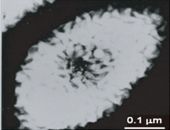August 6, 2011
Japanese Researchers Succeed in Producing World's First Bioethanol from Marine Alginate
Keywords: Environmental Technology Renewable Energy University / Research institute

Strain A1 : Copyright Kyoto University
Japanese researchers led by Professor Kousaku Murata at Kyoto University announced on April 28, 2011, that they have developed the world's first successful approach for producing bioethanol from alginate, a major component (accounting for 30-60 percent of dried algae) of brown algae such as kelp and wakame seaweeds.
Bioethanol production was possible due to metabolic modification and culture engineering analysis of Sphingomonas sp. Strain A1. It was reported that 13 g/L ethanol can be produced from aerobic culture in two to three days.
The production of bioethanol from starch and cellulose has been studied in Japan and abroad as an approach to increasing alternative energy production and to mitigating problems associated with global warming. In the case of biofuel production from land biomass, however, problems are found in supply volume, transportation, bioethanol-food conflicts, as well as the environmental impact of cellulose decomposition. Thus, bioethanol production from marine biomass has long been a goal.
The research was awarded the Topics Award at the Annual Meeting of the Japan Society for Bioscience, Biotechnology and Agrochemistry in fiscal 2011, although the meeting and presentation were cancelled due to the Great East Japan Earthquake. The research paper was published in "Energy & Environmental Science", a journal focusing on energy and environmental sciences and technologies.
Posted: 2011/08/06 06:00:15 AM
Reference
Kyoto University official website
Energy Environ.Sci., 4:2575-2581 (2011)
http://pubs.rsc.org/en/content/articlelanding/2011/ee/c1ee01236c
Related
"JFS Newsletter"
Related
"Popular Articles"
- New Nano-Bubble Technology May Help Dissolve Sludge and Improve Water Quality
- Japanese Firm Begins Development of Tidal Power Generation System
- Small Hydropower Generation System Developed for Use in Seawater, Weight Cut by Half
- Constructed Wetland Facility Established by Japanese University Purifies Livestock Farming Drainage
- Toyota CRDL Succeeds in World's First Artificial Photosynthesis Using only Water and CO2


